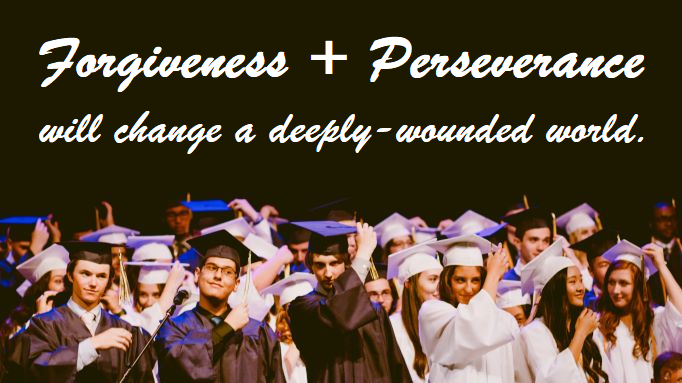Tagged: “family”
Perseverance as the Missing Piece to Family, School, and Community Forgiveness
Having studied the psychology of forgiveness since 1985 and having helped plant forgiveness education in schools since 2002, I have come to realize that there is another moral virtue that needs to exist alongside forgiving if forgiveness is to mature in minds, hearts, and groups. That virtue is perseverance, or the willed decision and action to keep going despite challenges and to not get distracted by other issues. In the ethical treatise, Virtues and Vices (attributed to Aristotle, but possibly written by one of his followers), the virtue of perseverance or endurance is said to exist alongside the virtue of courage and daring. I would add that perseverance will be a moral virtue as long as it is connected to both wisdom and justice (as well as courage) because it is good only if the goal to which people are dedicating a good part of their lives is fair and reasonable. Persevering in bank robbery, for example, is vice not virtuous.
Perseverance is rarely discussed in modern society as we play with our gadgets and move from one forum to another. This kind of quick movement is part of what the 17th century French philosopher, Blaise Pascal, in his masterful work, Pensées, refers to as diversion. He challenged readers by saying that most people cannot endure even one hour alone in their own room without seeking new diversions. If this was the case over four centuries ago, how much more might diversion be weakening our ability to engage in the moral virtue of perseverance now?

In an earlier blog, I related an interaction with Mr. Brian McParland of St. Vincent de Paul Primary School in Belfast, Northern Ireland in the fall semester of 2002. Upon approving forgiveness education in his school, he told me that I would last only 3 years at this task because that is all the time anyone ever seems to give to new classroom initiatives. In other words, people do not persevere. I have seen the same in local groups that start forgiveness education programs with adults only to have them fade over time. Yet, as Aristotle reminds us, and challenges us, it takes time to grow deeply in the moral virtues. We do not become proficient in any moral virtue by giving it a try for a little while any more than we become physically fit by hitting the gym for a month and then going back to the couch and the potato chips. It takes time and effort to become forgivingly fit. It takes time to grow in the moral virtue of perseverance.
So, it seems to me that the first step in growing intra-personally in forgiveness, in aiding families and schools and local community organizations to grow in forgiveness is to openly and boldly and persistently discuss perseverance and the serious challenge all people face as they say, “Let’s hit the forgiveness gym!” Without perseverance, we lose our forgiving fitness very soon.
How much perseverance do we need to change the world? It seems to me that we need to introduce students to forgiveness, without forcing them to forgive, from age 4 to age 18. It seems to me that we need two generations, about 40 years, of forgiveness in communities to change those communities and to change community-to-community conflicts, even brutal conflicts that seem at present to have no end in sight. Forty years? Forty years when there will be new distractions, new shiny diversions? Yes, and it is the teamwork of forgiveness and perseverance, and leaders who will take over for other leaders, that will win in the peace movement. This combination of forgiveness and perseverance never has been tried anywhere in the world at any time in human history. It is time.
With perseverance, we might just be able to bring forgiveness for good to a deeply wounded world. Long live perseverance! Long live forgiveness!
![]()
I sometimes lose my temper with my partner. Lately when I ask for forgiveness, he is unwilling to grant it. I have been patient, giving him time to forgive, and then I ask again with no effect. This leaves me with both shame and guilt. What do you recommend to me so that I can be freed from the shame and guilt?
Have you been working on your temper so that it does not get in the way of the relationship? Seeking forgiveness and changing behavior go together. If you are changing that behavior and because you have asked for forgiveness and have been patient, I think you can go in peace knowing that you have done your best for now. Give your partner time for him to work through his own forgiving.
I want to reconcile, but my partner keeps being mean to me. What do I do now?
If you want to forgive, I think you also need to ask for fairness. Then see how receptive your partner is to this call for justice. If you forgive first from your heart, then how you ask for justice likely will be more gentle than if you do so with deep anger. As we both know, it is important that your partner then see your pain and respond in a reasonable way to you.
I am a survivor of sexual abuse by my father, who is a pedophile. While I have healed fairly well from this (through therapy, medication, etc.), and pray every day to forgive him, I often struggle with feeling guilty over not visiting him at the nursing home where he currently resides. I pray every day for him, and sincerely do not wish harm to him. I fear that if I don’t visit him, I am not fulfilling Christ’s commandment to forgive him. Yet, I fear that visiting him might bring up some painful psychological memories, might put me back into a brief depressive/anxious state, and could lead me to an episode of Atrial Fibriliation (which for me seems to be provoked in times of extreme stress). A sibling of mine has been trying to get me to go visit my dad, and is of the belief that if we don’t visit him (“I was lonely and you visited me”, from Matthew 25), we might go to hell. Any wisdom you can share?
A key issue here is this: You are thinking that to truly forgive your father, then you must visit him in the nursing home. Further, you believe that if you do not visit him, you are disobeying Christ’s commandment to forgive him. Here is my view: To forgive is a process that unfolds over time as we work on that process of forgiveness. You are working on this process of forgiveness by: a) praying every day for the grace to forgive him; b) praying for your father; and c) wishing no harm to him. All of these are part of the forgiveness process in your case as a Christian. You need not reach complete forgiveness right now in that you have to behaviorally reach out to your father with a visit. I say this for this reason: Your **intentions** toward your father are good in that you pray for him and wish no harm to him. Further, your reason for not visiting him is honorable in that you need to protect your cardiac system. In other words, if your intention for not visiting your father in the nursing home is to punish him, then this would indicate that you are not yet forgiving. This is not the case for you. You have a good reason for not visiting right now because you have to protect your health. If, in the future, you think you are open to such a visit and, at the same time, you truly believe that your physical and emotional health are protected as you visit, then you could re-think your current decision. For now, I see no bad intentions at all on your part and so please keep praying for your father and for the grace to forgive and go in peace knowing you are doing the best that you can under the circumstances.
What advice can you offer to me about the following frustrating situation: I have forgiven my partner, offering compassion and empathy toward her. She was insensitive to me on several occasions when she was under deep stress at work. She is convinced that other people cannot know her own private world and so empathy, in her view, is unreachable. In other words, my words of empathy are hollow for her. What do you suggest that I do? I ask because she seems to think that true forgiveness, involving empathy, is impossible.
This is a very interesting situation. I say that because I have not encountered a situation like this until you brought it up. If she thinks that you cannot know her inner world, even though you are convinced that you are able to do this to a degree, then you might try a different approach. Instead of using words that suggest you have empathy for her inner world, try to focus instead on her behavior and circumstances, not to excuse her behavior but to put it in the context of her recent challenges when she hurt you. She should be able to see that you are able to concretely observe the behaviors and circumstance that increased her stress and likely contributed to her insensitive remarks. She then should be able to understand that you are viewing her as a valuable person who is more than the insensitivities she has shown to you.




